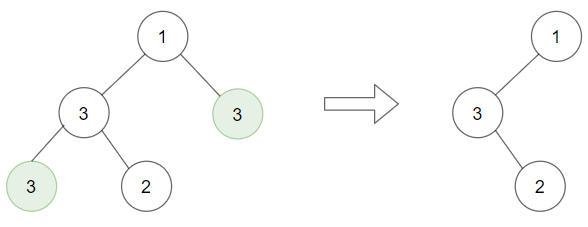Given a binary tree root and an integer target, delete all the leaf nodes with value target.
Note that once you delete a leaf node with value target, if its parent node becomes a leaf node and has the value target, it should also be deleted (you need to continue doing that until you cannot).
Example 1:

Input: root = [1,2,3,2,null,2,4], target = 2
Output: [1,null,3,null,4]
Explanation: Leaf nodes in green with value (target = 2) are removed (Picture in left).
After removing, new nodes become leaf nodes with value (target = 2) (Picture in center).
Example 2:

Input: root = [1,3,3,3,2], target = 3
Output: [1,3,null,null,2]
Example 3:

Input: root = [1,2,null,2,null,2], target = 2
Output: [1]
Explanation: Leaf nodes in green with value (target = 2) are removed at each step.
Constraints:
- The number of nodes in the tree is in the range
[1, 3000]. 1 <= Node.val, target <= 1000
这道题给了一个二叉树和一个目标值 target,说是让删除所有结点值为 target 的叶结点,且题目中说了新生成的叶结点若值为 target 也要删除。这很明显是一个从下到上的处理过程,也就是后序遍历,因为只有删除了掉了当前的叶结点,才有可能形成新的叶结点。后序遍历用递归的方式写比较简单,首先判空,然后对左子结点调用递归函数,并将返回值更新左子结点,然后再对右子结点调用递归函数,并将返回值更新右子结点。此时若左右子结点是满足要求的叶结点的话就已经被删除了,此时判断若左右子结点为空,则当前结点也是一个叶结点,若其结点值为 target,则返回空,否则返回 root 即可,参见代码如下:
class Solution {
public:
TreeNode* removeLeafNodes(TreeNode* root, int target) {
if (!root) return nullptr;
root->left = removeLeafNodes(root->left, target);
root->right = removeLeafNodes(root->right, target);
return (!root->left && !root->right && root->val == target) ? nullptr : root;
}
};
Github 同步地址:
https://github.com/grandyang/leetcode/issues/1325
参考资料:
https://leetcode.com/problems/delete-leaves-with-a-given-value/
LeetCode All in One 题目讲解汇总(持续更新中...)
标签:结点,target,1325,Leaves,Given,value,nodes,null,root From: https://www.cnblogs.com/grandyang/p/17023175.html